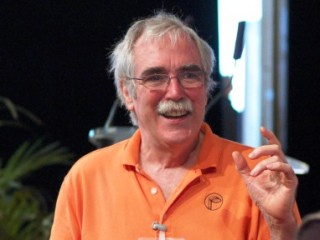
Eric F. Wieschaus biography
Date of birth : 1947-06-08
Date of death : -
Birthplace : South Bend, Indiana, United States
Nationality : American
Category : Science and Technology
Last modified : 2011-09-21
Credited as : biologist, geneticist, Nobel Prize for Physiology or Medicine
1 votes so far
At Notre Dame, Eric F. Wieschaus was an activist against the Vietnam war, and the student fly keeper for thousands of Drosophila fruit flies. He came to hate the tiny insects almost as much as the war. In graduate school at Yale he only earned a 'C' in cellular biology. In a different class, though, he was so enraptured by a lecture on genetics he accidentally stabbed himself with his pencil.
In his later collaboration with Christiane Nüsslein-Volhard, Wieschaus identified 139 genes necessary for the fruit fly's existence, including genes crucial to forming muscles, eyes, heads, and other vital body parts. For his research into the genetic mechanisms that control embryonic development, showing that three sets of genes (gap genes, pair-rule genes, and segment-polarity genes) are involved, Wieschaus and Nüsslein-Volhard were awarded the Nobel Prize in Medicine in 1995, sharing the honor was shared with Edward B. Lewis. Wieschaus's wife, Gertrud Schüpbach, is a Swiss-American molecular biologist, and a professor at Princeton.
With Nüsslein-Volhard at Heidelberg, Wieschaus examined mutations in 40,000 fruit fly families, discovering that about 5,000 of the fly's 20,000 genes are important to embryonic development and about 140 are essential. Their research, published in the English scientific journal Nature in 1980, generated the widely accepted model that three sets of genes control subdivision in the developing embryo: gap genes, a blueprint for general body development; pair-rule genes, which subdivide these general regions into body segments; and segment-polarity genes, which affect specific structures within these segments. Their work helped scientists to better understand congenital mutations in other animals, including humans.
Awards:
Nobel Prize for Medicine 1995 (with Edward B. Lewis and Christiane Nüsslein-Volhard)
American Philosophical Society
American Academy of Arts and Sciences
Federation of American Scientists Board of Sponsors
National Science Foundation Fellowship (1963)
National Academy of Sciences
















